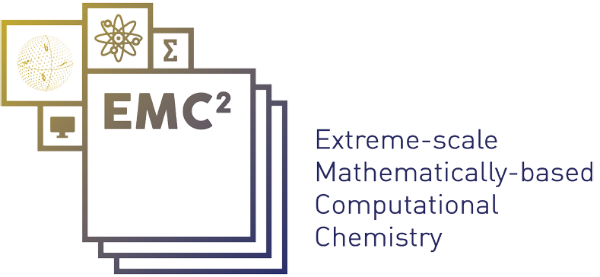
- This event has passed.
Kick-off meeting EMC2
7 October 2019 @ 8 h 00 min - 9 October 2019
Kick-off meeting EMC2
Molecular simulation is one of the most dynamic areas of scientific computing. Its field of application is very broad, ranging from theoretical chemistry and drug design to materials science and nanotechnology. Its importance in modern science has been acknowledged by two Nobel Prizes (Kohn & Pople in 1998; Karplus, Levitt & Warshel in 2013). It is also a gold mine of exciting problems for mathematicians and computer scientists.
Molecular simulation can be used as a virtual microscope to study more or less complex molecules with atomic-scale space-time resolution. It can also be used as a tool for computer-aided design (CAD) and the engineering of new molecules, materials and nano-devices.
However, molecular simulation still has important limitations. In particular, the simulation of very large molecular systems, or smaller systems in which electrons interact strongly with each other, remains out of reach today. Overcoming these limitations is extremely difficult. This requires joint breakthroughs in several disciplines, and can, in our opinion, only be achieved through an intensive multidisciplinary effort such as those made possible by ERC-Synergy-type funding.
Our objective is to overcome some of the current limitations in this field and to provide academic communities and industrial companies with new generation, dramatically faster and quantitatively reliable molecular simulation software, to enable those communities to address major technological and societal challenges of the 21st century (in health, energy, and the environment, for example).
Indeed, these challenges require an understanding of the intimate properties of matter at the atomic scale and the development of engineering techniques at that scale. The molecular simulation models, algorithms, and software that we plan to develop in this project will enable the use of CAD (computer-aided design) for new drugs, materials or nano-objects.
An example of progress will be to provide error estimates on the results from numerical simulations (what we call « a posteriori estimators and indicators »). Results can then be supplemented with error bars, which is usual for experimental results. These error bars are crucial for estimating the reliability of the results and their scope.
The high-performance scientific computing component will allow us to integrate new concepts such as algorithms that minimize data transfer between processors, so they can scale on supercomputers, while also reducing energy consumption. These algorithms will be developed and used to accelerate molecular dynamics calculations on future exascale and post-exascale systems (i.e. ten to a thousand times faster than systems currently available). They will also be dedicated to methods from quantum chemistry to efficiently calculate the electronic structures of systems with highly correlated electrons.
This requires dealing with the curse of dimensionality (i.e. the exponential increase in complexity as a function of dimension) inherent in these systems. For this purpose, algorithms and a dedicated computer library using a representation of the data in large dimensions by objects called tensors will be developed, to enable their effective compression, i.e. their representation by simpler objects in small dimensions, while preserving the information. The library will benefit other fields that process large amounts of data, such as artificial intelligence.
This project represents a great opportunity to carry out innovative and cutting-edge research at the interface of chemistry, computer science, and mathematics, which, through major advances in each of these disciplines as well as at their interfaces, will make it possible to discover in silico new molecules and materials.
Ideally, we would like to model an entire cell in all its complexity, paving the way for genomics and personalized medicine at the atomic level. In another area we will develop innovative approaches to simulate new materials such as multilayer 2D materials that have amazing physical properties, many of which are yet to be discovered.
